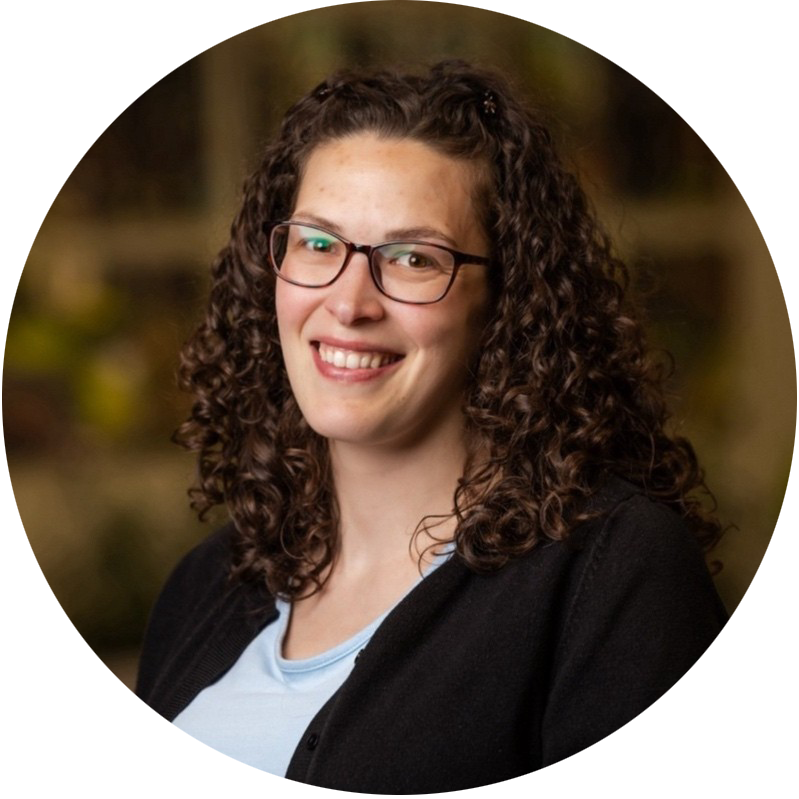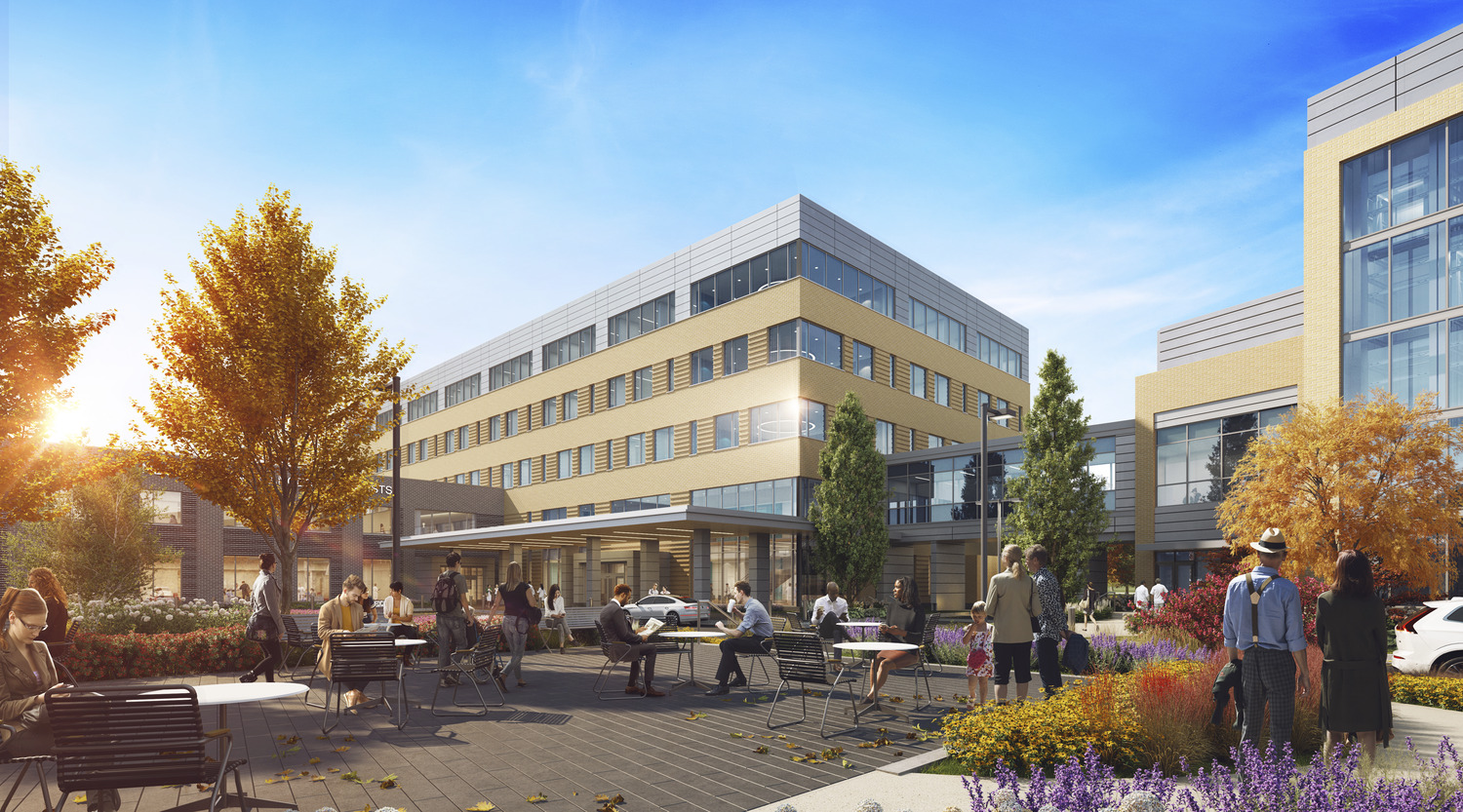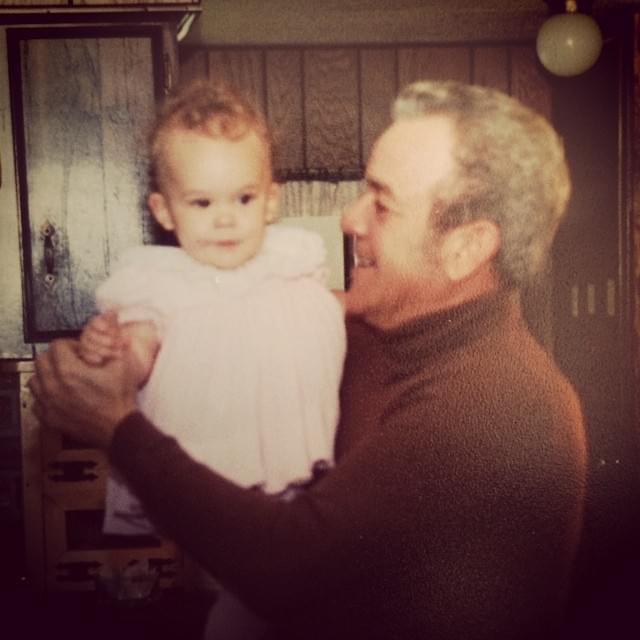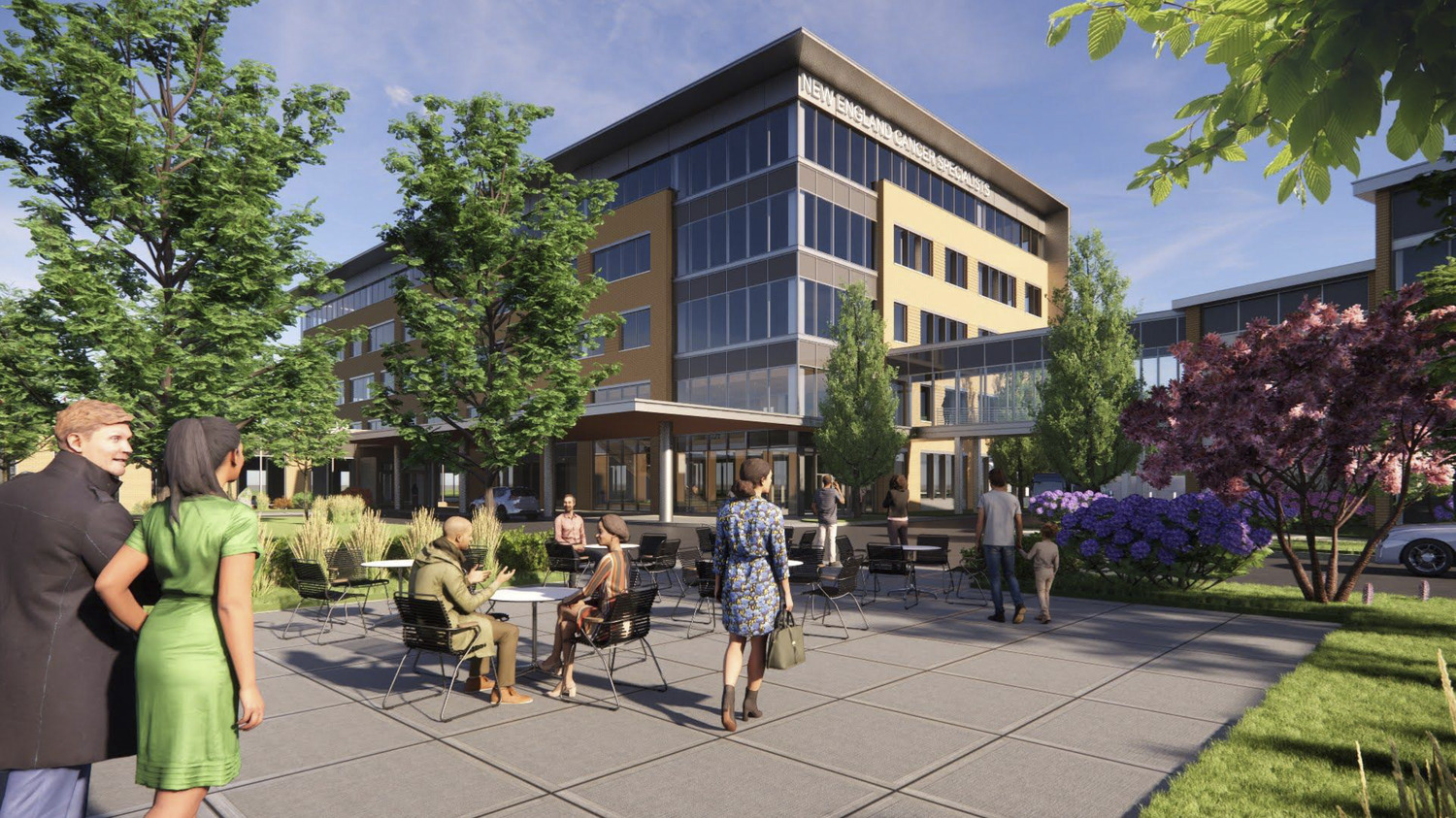
Ashley VanBuskirk, project manager for New England Cancer Specialists (NECS), says she was drawn to the physician-owned practice due to its collaborative spirit and patient-centric philosophy.
“The organization started nearly 60 years ago with a single oncologist who opened his own practice, and now we’re the region’s largest cancer-specific practice,” says VanBuskirk, who has been with NECS for seven years. NECS serves patients in Maine and New Hampshire and partners with area health systems and hospitals.
 The Partnership: Page served as project architect for Rock Row’s Medical & Research Campus in Westbrook, Maine. Slated to open in January 2025, the site provides an array of integrated health services, anchored by NECS. Designed with patient input, the facility has a patient triage system based on oncological paths, with distinctive wayfinding. The site’s natural, wooded setting was preserved, and unique elements were incorporated, such as outdoor infusion bays (a first for Maine,) a healing garden, water features, and convenient access to a trail network.
The Partnership: Page served as project architect for Rock Row’s Medical & Research Campus in Westbrook, Maine. Slated to open in January 2025, the site provides an array of integrated health services, anchored by NECS. Designed with patient input, the facility has a patient triage system based on oncological paths, with distinctive wayfinding. The site’s natural, wooded setting was preserved, and unique elements were incorporated, such as outdoor infusion bays (a first for Maine,) a healing garden, water features, and convenient access to a trail network.
Three Things to Know about Creating a Space for Cancer Care:
1. Recognize that ambience and amenities matter. NECS wanted its new space at Rock Row to be not just larger, says VanBuskirk, but imbued with a healing ambience and plentiful amenities for patients and their families. “We know we can give you chemotherapy, but we also know if you’re stressed out, have two young kids at home, are missing work, worried about making rent, or your car is broken down, these factors will figure just as heavily into your long-term outcome,” she says.
2. Invite cancer patients to be involved in designing a family-centered clinic. NECS asked several former patients to help the design team plan its new facility. “So instead of us telling patients what they need, patients told us, ‘I sat in that seat last year; let me tell you what I needed.’” They also inspired the creation of support groups, such as one for young women with breast cancer. “We had a whole group of women in their 30s, each of whom thought they were the only one to get cancer that young,” VanBuskirk says.
3. Consider outside areas a valuable part of the patient-caregiver on-site experience. “Our new space has a natural feel to it,” VanBuskirk says. “And there’s a focus on getting people outside, with the healing garden, which includes water features, raised beds, and a butterfly area, as well as walking trails.” The infusion bays are intentionally located in the back of the facility along or across from a wall of windows so that every seat will have a scenic view and access to the outside. “Caregivers can go out, even if just for a few minutes, to get some fresh air,” VanBuskirk says. “And patients who qualify will be able to take their infusion treatments outside. What better way to escape?”
A Deeper Dive
Ashley VanBuskirk grew up in Bangor, Maine, and has a bachelor’s in biology from the University of New England. She says the state’s ragged coastline is not only beautiful but vast: if stretched out, it would cover the entire East Coast, measuring more than 3,400 miles.
Much of the state is sparsely populated, which means specialized medical care is sometimes hard to come by. “We have high cancer rates in Maine, due to some of the industries: big lumber, paper mills, shipyards, and other chemical and environmental factors,” she says. “But some patients have had to drive to Boston, which is two hours each way, for cancer treatments or clinical trials. New England Cancer Specialists (NECS) was able to help with bringing more of those treatments here.”
VanBuskirk first trained to be a nurse’s aide, starting out in a cardiac unit then moving to an oncology unit at Eastern Maine Medical Center. When she discovered NECS, it seemed the perfect fit. “Our company is physician owned, and I know all of them and have earned their trust over the years,” she says. “If I have an idea about something that will be a positive for our patients and make a compelling case they will listen. They don’t let the fact that they are business owners override being doctors.”
 Cancer care is personal
Cancer care is personal
“Like many, we’ve had cancer impact our family,” says VanBuskirk, whose grandfather was diagnosed with lung cancer when she was in middle school. “I had this special position of being the first grandchild. He used to take care of me if daycare was closed or I was sick. I loved hanging out with him. He grew up in New Orleans and loved jazz and Big Band music. There are pictures of him twirling me around the room.”
Grandfather and granddaughter also tinkered on a 1987 Mustang convertible built the year she was born. “My grandpa passed away when I was 12, but I drove that car from 16 to 20,” she says. “It was my summer car.”
She thinks about the advanced treatment options her grandfather would have now that weren’t available back then. “He did everything he was supposed to, but the lung cancer came back in three months.” VanBuskirk and her mom, a social worker, moved in with her grandparents to help care for him. “Unfortunately, he passed away,” she says. “Home hospice was involved, and the team that took care of him was amazing.”
Going the extra mile
Through this and other experiences, VanBuskirk came to realize how critical consistency and comfort are in cancer care, as treatment is most often a marathon not a sprint. At NECS, she says, patients have a dedicated care team with an advanced practice provider, oncology nurse, medical assistant, and patient care coordinator, ensuring continuity.
And while NESC isn’t a hospital and can’t stay open 24/7, sometimes its patients do need immediate care or assistance, which is why it has an urgent care clinic open every weekend. For their new Bispecific Antibody Therapy program, NECS “developed an on-call team that can meet a patient here with a doctor, pharmacist, or nurse, ready to come in day or night to treat urgent side effects that can occur with this type of treatment,” VanBuskirk says. “It’s just the right thing to do.”
Another bonus to being smaller, she says, is that NECS can help patients find resources: “For example, our finance team members can meet with patients facing hardships and find grants through nonprofits or pharmaceutical companies, foundational support, or free or discounted drugs if they have a high deductible. Last year they were able to find nearly $6 million in free drug and co-pay assistance alone.”
Easy access and top-notch care
 Rock Row might be mistaken for a mall or a dining hot spot. There are trendy restaurants, an REI, live music, and breweries. The medical and research campus enjoys easy access to these amenities but is naturally separated by a tree line and stream for tranquility.
Rock Row might be mistaken for a mall or a dining hot spot. There are trendy restaurants, an REI, live music, and breweries. The medical and research campus enjoys easy access to these amenities but is naturally separated by a tree line and stream for tranquility.
And with its new, larger location, NECS will be able to focus even more on cancer research. NECS prides itself on being able to offer promising new protocols and drug treatments to patients in the region and participates in more clinical trials than any other cancer care facility in Maine.
“This place of healing, where state-of-the-art care, clinical research, and a holistic approach to healthcare merge, will enhance our mission and continue making life better for people with cancer and blood disorders,” Chiara Battelli, MD, president of NECS, says of the Rock Row Medical & Research Campus. “This contemporary center will allow us to continue offering leading-edge cancer treatments to our patients and participate in research with world-renowned partners who are striving to improve the understanding and treatment of cancer today, and in the future.”
VanBuskirk worked closely with Battelli as her executive assistant and a patient care coordinator before transitioning to the project manager role and is equally excited about the opportunities presented by the new facility. “We’d been in our old location almost 15 years—in not even 20,000 square feet of space—and we were eking out the use of every square foot,” she says. “It will be a relief to have ample space.”
Health Partner Insights is a continuing series where we tap the collective wisdom of our healthcare clients on current challenges, trends, and technologies.